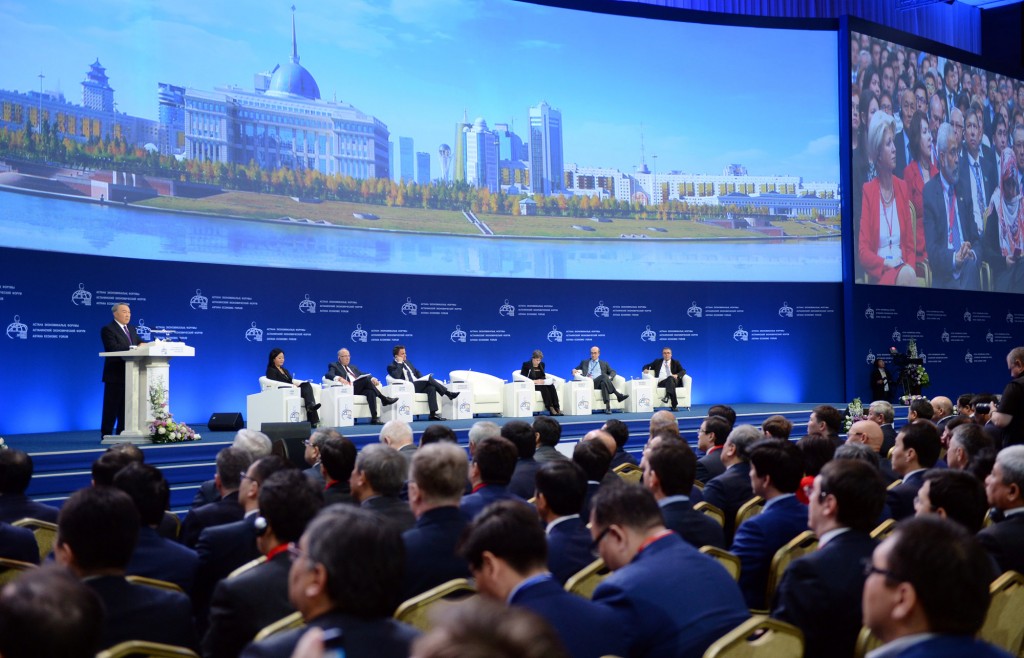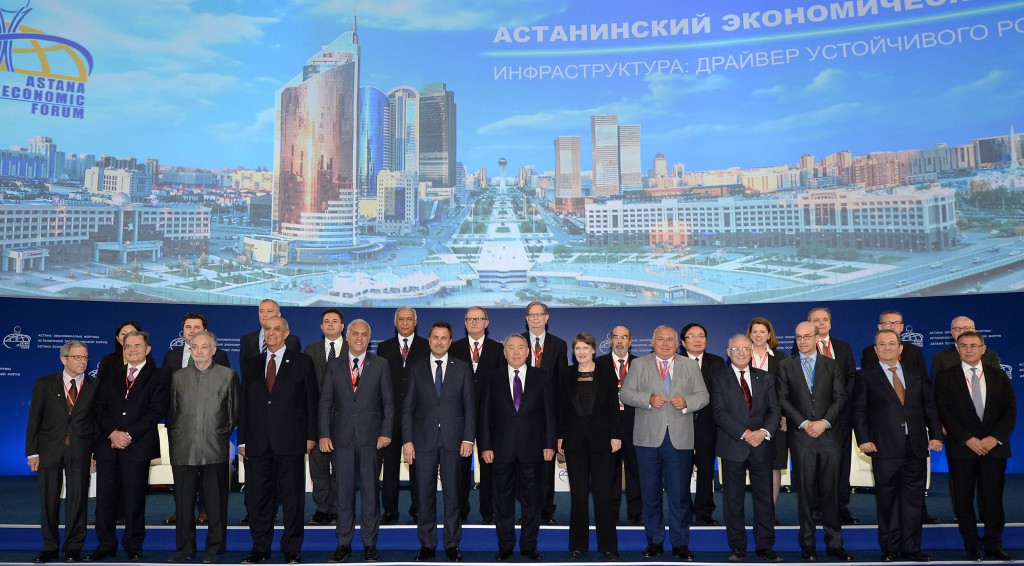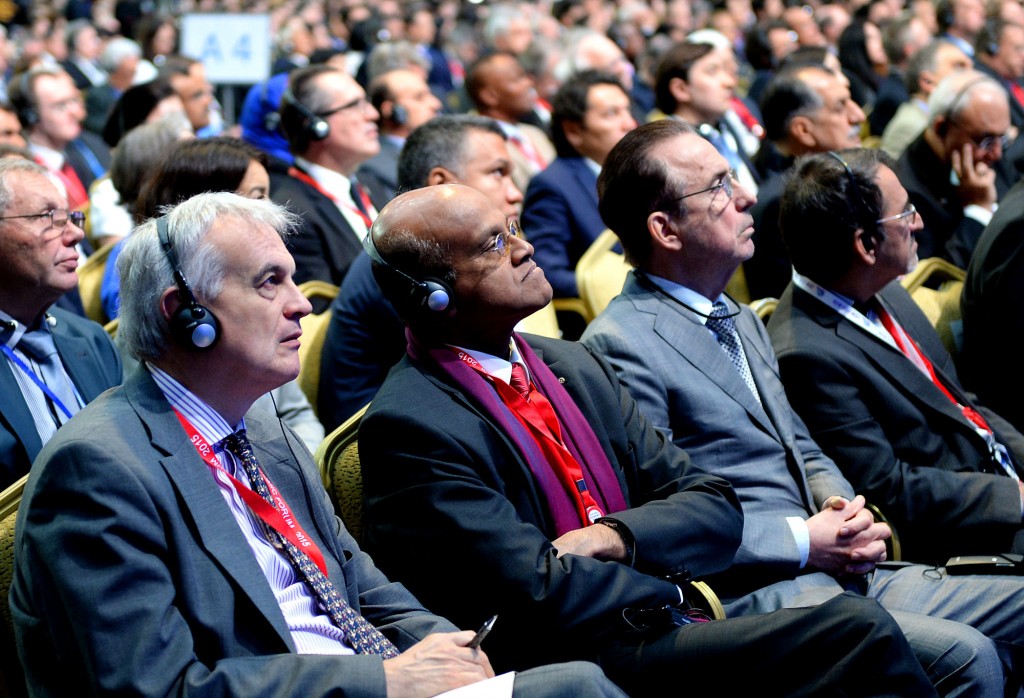ASTANA – President of Kazakhstan Nursultan Nazarbayev made a few bold announcements to the delegates of the Astana Economic Forum (AEF) at the forum’s main plenary session on May 22, including the announcement of a plan to create an Astana International Financial Centre (AIFC).
Speaking first among panellists including top-level economists, financiers and politicians, Nazarbayev commented that the crisis which brought about the need for the AEF in 2008 is not over, and while experts now speak of a gradual recovery, signs of growth are scattered. “Many countries still can not get out of stagnation,” said Nazarbayev. “Other economists believe that the global crisis of 2008 was systemic, cyclic, and will end only when the key reason for it is eliminated: the profound, accumulated imbalances, first of all in the currency and trading markets.”
The President also said that these hidden, latent roots of the crisis are moving from the financial sphere into currency wars and economic wars in form of illegal sanctions shaking many countries. “This is what generates an increase in confrontation between East and West, the U.S. and NATO against Russia and China,” said the President.
Nazarbayev also spoke of three global challenges that are a threat to future prosperity. First is the fragmentation of the global order. “We are witnessing the disintegration of the old checks and balances throughout the world, the loss of trust between the leaders of the great powers and the corrosion of international law.”
Second are the elemental challenges such as climate change and pandemics. “Climate change is happening faster than expected. This affects the severity of natural disasters,” he said. Third is the continued food shortage. Under the pressures of population growth, urbanisation and increasing incomes, food production will need to double over the next 30 years, the President said. “And it will have to do at a time when the Earth’s resources are being depleted,” he noted.
Kazakhstan’s government is already implementing some specific programmes that will help overcome these challenges on a local and global scale. According to the President, the recently adopted Nurly Zhol economic stimulus programme, which focuses on building infrastructure, will achieve a number of significant results. By 2019, travel time between major cities will be reduced by a third, and access to the neighbouring countries will be easier, he said. Kazakhstan will form a unified energy system to fully meet electricity demand in the country. Doing all of this, the programme will create half a million new jobs, he said.
The President also said that deeper reforms are needed for sustained growth and the transition of Kazakhstan to the category of developed countries. He mentioned that five areas of institutional reform were his campaign manifesto in the recent presidential election.
“These are the improvement of public administration and the rule of law, promoting economic growth, strengthening the Kazakh identity and, finally, improving the transparency and accountability of the state. The implementation of these reforms has already been adopted and a concrete action plan titled ‘Modern State for All’ has been published.”
 The President also mentioned that a country programme with the OECD has been signed as part of the reforms to be introduced, with the most advanced tools and standards of public administration in the most developed countries.
The President also mentioned that a country programme with the OECD has been signed as part of the reforms to be introduced, with the most advanced tools and standards of public administration in the most developed countries.
Nazarbayev also announced that the Astana International Financial Centre would be established on the premises of the EXPO 2017 specialised exhibition. “We have held talks with representatives of the Dubai [International Financial] Centre and agreed that their experience will be completely transferred to Kazakhstan. Thus, our focus will be based on [introducing] the principles of English law, a preferential tax regime and an independent financial court. We are confident that the Astana financial centre will be the core of the financial infrastructure in Kazakhstan, and in the future [will turn into] a financial hub of the whole Central Asian region.” This announcement, particularly that the centre would use English law and be independent in terms of its judiciary, drew praise from other panellists.
Finally the President spoke of the construction of new railways and logistics facilities. Kazakhstan recently opened the Lianyungang logistics terminal port in the Yellow Sea, providing a direct route from Europe through Russia, Central Asia, the Asia-Pacific region, and vice versa by rail. During the first year of the volume of cargo from China to Europe rose by 80 percent. Meanwhile the completed construction of the Zhezkazgan-Beineu railway created a more direct connection for China through Kazakhstan to the Caspian seaports.
“All these projects are aimed at increasing the transit potential of both our country and the whole of the Eurasian Economic Union,” said the President. “This is the new Silk Road. Forty countries have showed an interest in free trade with the Eurasian Economic Union. But we must not stop there. I propose to create a new high-speed, multi-modal transport route, the Eurasian transcontinental corridor.”
For the future, the president suggested creating a permanent platform within the framework of the unified Eurasian space to discuss proposals for the future direction of the continent, increasing integration between all its members. “The Astana Economic Forum could become such a platform,” suggested the President.
Chief Business Correspondent and Talking Business presenter of the BBC, Linda Yueh, who moderated the session, presented the other panellists. Those included Xavier Bettel, prime minister of Luxembourg; Helen Clark, administrator of the UN Development Programme; Jacob Frenkel, chairman of JP Morgan Chase International and former governor of the Bank of Israel; Kenneth Rogoff, professor at Harvard University and former IMF chief economist; and Nouriel Roubini, chairman of Roubini Global Economics and a professor at New York University. Angel Gurria, Secretary-General of the Organisation for Economic Cooperation and Development, who couldn’t attend the forum in person, sent a special video message.
Speaker after speaker were returning to President Nazarbayev’s speech in their own remarks, commenting specifically on the Nurly Zhol programme and the proposal to establish the AIFC.
“If I understood the translation correctly, the Astana financial centre would have English law at its basis. This and other conditions would mean this will be a game changer,” Rogoff said in his remarks.
